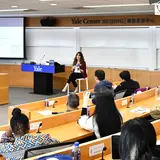
Startup Stories: Using Robots to Maintain Energy Systems
Dianna Liu ’18 founded ARIX, a company that produces pipe-crawling robots to inspect energy networks and prevent environmental damage.
To mark the 10-year anniversary of Yale SOM’s Program on Entrepreneurship, we’re checking in with alums who benefitted from the program’s resources when launching their ventures.
As an engineer at Exxon Mobil, Dianna Liu ’18 saw firsthand a major problem in the energy industry: pipe corrosion that creates safety and environmental hazards and, by one estimate, costs $2.5 trillion around the world each year.
Liu knew she wanted to create a technology to address the issue. She also knew she wanted an MBA to launch her own company. But she didn’t know where she wanted to pursue the degree until she heard Yale SOM Program on Entrepreneurship Director Kyle Jensen speak at an event for admitted students.
“That was what pushed me over the edge,” she remembers. “He wasn’t pitching Yale or SOM. He was saying, ‘Here’s how we can help entrepreneurs.’ All the classes could be applied to building a company.”
Liu took that advice to heart when she left her job for SOM, enrolling in “incredibly influential” courses with Senior Lecturer A.J. Wasserstein and Professor of Finance Song Ma. She also took “every course I could get my hands on” with Jensen and Program on Entrepreneurship Associate Director Jennifer McFadden.



Liu founded ARIX Technologies, a company that uses pipe-crawling robots to perform pipe inspections, while a student in 2017. She won the Tsai Center for Innovative Thinking at Yale’s Miller Prize that year, and closed on a $2 million seed-funding round the week of her graduation. That money allowed her to hire two Yale College engineering graduates, who are still with the company today. ARIX now employs 30 people, and has completed two more funding rounds of $5 million and $10 million. Customers include NASA, Con Edison, Shell, and Saudi Aramco, among others.
Liu took a risk when she left her job in the energy industry to pursue her dream. But she says the experience has been worth it.
“Knowing [ARIX] is helping make people and plants safer while also helping make the companies more money—it’s a win-win.”
Looking back, Liu says her SOM experience lived up to Jensen’s promise. In fact, she often used class projects to hone ideas for her then-nascent company.
“It was amazing having very smart classmates who could think differently than me, and teachers who could offer real advice, and then take that and run with it,” she says.



